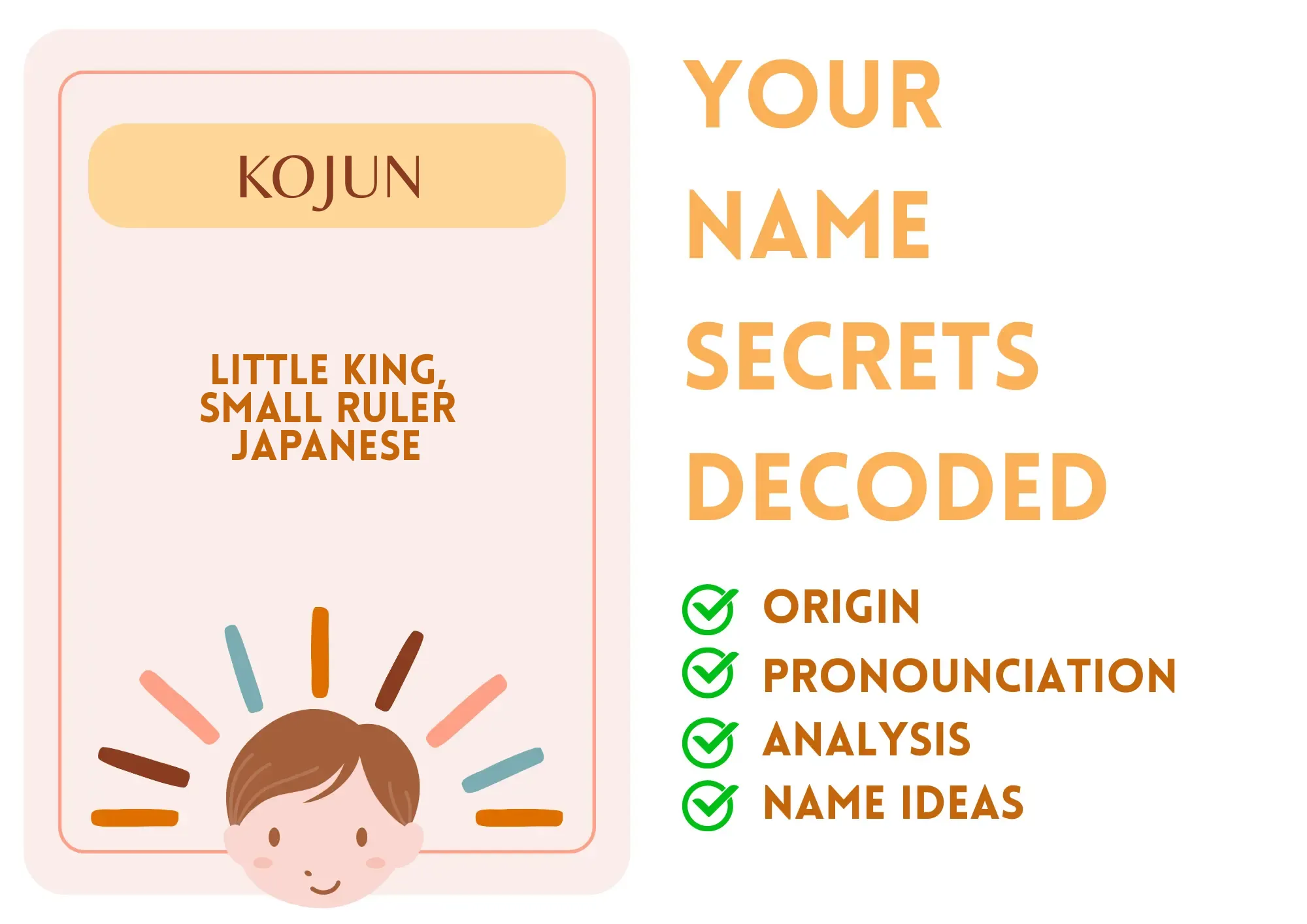
Kojun
Kojun is a name of Japanese origin that translates to 'little king' or 'small ruler' (from 'ko' meaning small and 'jun' meaning ruler). It is predominantly used in Japan and within Japanese-speaking communities. The name is typically associated with boys, although it can also have a unisex appeal depending on cultural context. Kojun reflects a sense of authority, leadership, and nobility in a compact form.
The name has cultural significance due to its association with royalty and leadership, making it a distinguished choice for parents wishing to impart those values onto their child. It is perceived positively, often evoking feelings of ambition and strength.
In popular culture, while Kojun may not be as widely recognized, it’s sometimes found in anime and manga series where characters embody a royal or notable personality. The name is straightforward to write and pronounce, and it has common nicknames that add familiarity.
Basic Information
Gender: Boy
Sounds Like: KOH-jun
Pronunciation Explanation: The first syllable 'KOH' rhymes with 'row' and the second syllable is pronounced like 'jun' in 'junior'.
Summary and Meaning
Meaning: little king, small ruler (Japanese)
Origin: Kojun has Japanese origins, rooted in the linguistic blending of 'ko' (小), meaning small, and 'jun' (君), meaning ruler or king.
Usage: Kojun is traditionally a masculine name, most commonly given to boys.
Name Number (Chaldean)
Name Number (Pythagorean)
Popularity (Global Rank)
Overall: 572751
Boys: 54235
Most Popular in
Religious and Cultural Significance
Religion: Shinto
Background: In Japanese culture, names often reflect cultural values rather than specific religious connotations, but royal and authoritative themes are valued in Shintoism and Japanese tradition.
Cultural Significance: The significance of Kojun stems from its evocation of leadership and royalty, making it a name that is valued for instilling a sense of ambition.
Historical Significance: Kojun, while not steeped in extensive historical references, carries the weight of concepts associated with leadership and nobility which are prevalent in Japanese history and culture related to emperors and shoguns.
Popular Culture
Literature and Mythology: Kojun may appear in modern literature or Japanese folklore where character names denote status.
Movies and Television: There are few direct references to the name Kojun in mainstream media, but it may be used in character names in anime or manga settings, often reflecting strong or noble personalities.
Feelings and Perceptions
Perception: Kojun is generally viewed positively, as it suggests leadership and respect. Parents may feel it carries an aspirational quality.
Positive Feelings: Noble, ambitious, strong, unique, culturally rich.
Negative Feelings: Some may find it less familiar or may mispronounce it initially due to its distinctiveness.
Practical Considerations
Ease of Writing and Calling: Kojun is relatively easy to write and pronounce, consisting of six letters and two syllables, making it memorable and straightforward.
Common Typos and Misspellings: Kojan,Kojon,KoJun,Koju
Common Nicknames: Ko,Jun,Koj
Kojun Popularity
Kojun Usage and Popularity By Country
| Country | Rank (Overall) |
|---|---|
| Japan | 8940 |
| United States | 344452 |
Kojun Usage and Popularity By City
| City | Rank (Overall) |
|---|
Compatibility Analysis
Famous Persons Named Kojun
Related Names
Similar Sounding Names:
Keiran,Kyojin,Kotaro,Kenjun